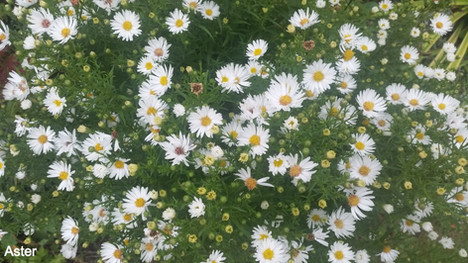Big Decisions and Hello Autumn!
- Clare
- Sep 25, 2020
- 4 min read
Firstly, huge apologies for my lack of posting over the past four weeks. It has been a busy time and one in which momentous decisions have been made! To come straight to the point, we have decided to sell our cottage and pass my lovely little garden onto the care of someone else. I won't bore you with the reasons why, but needless to say the decision was not an easy one and, whilst (hopefully) exciting times lie ahead, there will be some sadness to leave our current home.
Our plans are not immediate. We intend to put the house on the market when things pick up a little, and then move closer to family in the north of the country. Hopefully I will be able to continue recording our changing circumstances in this blog.
Despite all of these changes, the garden moves on as normal of course. The insects have been enjoying the last of the autumn sunshine and gorging themselves on nectar from the remaining flowers. The rich palette of the summer is long gone, but there are still several patches of colour around the garden as the odd rose and hollyhock still blooms and the lovely lavatera, geraniums and perennial sunflowers are still holding their own.
The crocosmia and anemones are starting to fade, though a few cosmos have appeared from my wildflower mix of the summer and my little clump of starry asters is looking cheerful.
The bees have found the sedum flowers such that they buzz noisily from morning until night. I really cannot recommend this plant highly enough as a source of late colour and food for hungry insects.
There are also still a good number of cabbage white butterflies fluttering between the flowers and this morning I smiled as a determined duck spent a good five minutes chasing one around the garden (he didn't catch it). Other insects are already starting to hibernate and I found several clusters of ladybirds hiding in the depths of the crocosmia leaves and St Johns Wort as I thinned them out earlier this week.
Despite the definite change in temperature, predominantly over the last few days, autumn is a time of plenty for much of the wildlife in the garden as the berries and hips are becoming ripe, the ivy is starting to flower and the sunflower seeds have fully formed. As the weather gets colder and less energy is spent rearing grubs, the wasps have also engaged in their annual feeding frenzy and have been getting drunk on our remaining windfallen apples. Sadly, we had to remove a young willow and pollard another two this year and, for several days thereafter, the stumps were covered in wasps feeding on the sugary sap. I know and understand why wasps aren't everyone's favourite flying insect, but you have to admire the industrious way they work and feed. They are also incredible predators which play an important role in keeping the numbers of other insects in check. I once played a very small role in a university project which investigated blow fly ecology and the incidence of sheep strike in the U.K. and this became my first real introduction to the thousands of species of wasps currently recognised in this country. I spent many an hour trudging around fields, collecting the insects caught in baited traps and then assisted in counting and identifying species back in the laboratory. It was here I learned how to sex a blow fly (it is surprisingly easy!) and experienced the awesome predatory power of wasps as I witnessed them swooping down to catch the poor unsuspecting flies that escaped from our traps.
The two willows we pollarded will return with vigour next year and, in the meantime, our patio area is suddenly looking incredibly spacious. I have to admit, this species of willow is not my favourite tree as it drops so many leaves and fills the air (and our hallway!) with its fluffy white seed heads in the Spring. I would never remove a tree without good reason however and the willows in our garden are host to a wide variety of birds and insects, from young ladybirds to the goldfinches that collect the fluffy seed heads.

Thinking about it, willows must rival oaks and yews for their historical significance and symbolism. Perhaps our close association with the tree derives from our ancestors' need to find water, its medicinal properties, or the pliability of the branches to weave into a variety of uses. Possibly its just the romance of the riverbank that makes some species of willow so appealing (from Chinese pottery and Monet paintings to Shakespeare - the willow features everywhere!) or the lovely fuzziness of spring catkins simply reminds us of childhood. My grandad used to have a large weeping willow in his garden that I loved to sit under and would pretend I was Tarzan swinging through the branches! I also love the reflection of the willows in the brook that runs through our garden and could sit for hours watching the leaves shimmer and sway as they catch the breeze.
The ease with which willow grows and its abundance in our garden, led us to plant some branches along our bank as a precursor to attempting willow spiling - an environmentally friendly, cheap and effective way to stabilise the river bank and prevent erosion. The few willows we planted experimentally earlier this year have taken, though this project will have to be carried on by someone else!
I do hope that whoever inherits the garden loves it as much as I have. It is hard not to become sentimental about the things I have planted as it has been such a labour of love. However, hopefully a more able gardener will improve things further and I will be able to apply all that I have learned to a new garden that currently awaits somewhere further north.
Quote from The Wind in The Willows by Kenneth Grahame
"The Mole was bewitched, entranced, fascinated. By the side of the river he trotted as one trots, when very small, by the side of a man who holds one spellbound by exciting stories; and when tired at last, he sat on the bank, while the river still chattered on to him, a babbling procession of the best stories in the world, sent from the heart of the earth to be told at last to the insatiable sea."

























Comments